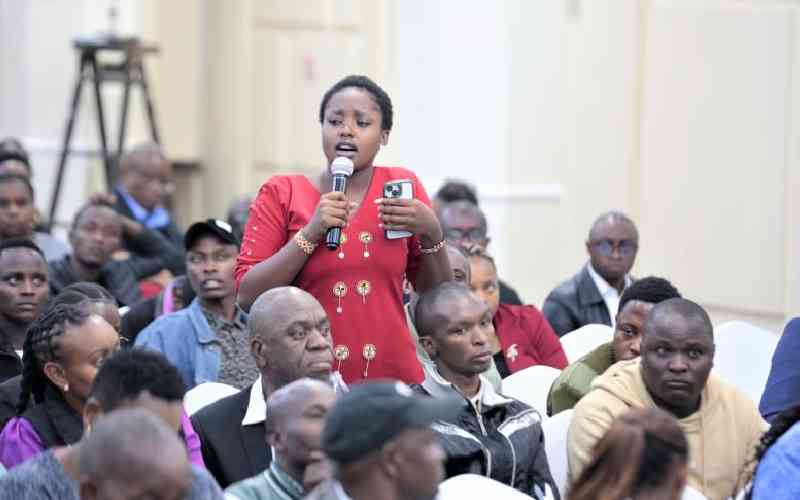Key among the takeaways from deliberations at the just-concluded 6th Global Entrepreneurship Summit was the empowerment of women and youth. Various speakers, including US President Barack Obama, emphasised the need to empower women and the youth if we are to make meaningful strides in socio-economic spheres.
From the very onset, the Jubilee administration made it clear that the interests of women and youth would be central in its development agenda.
It is widely acknowledged that resources in women’s hands have a range of positive outcomes for human capital and capabilities within a household. Research findings also suggest a strong instrumental rationale for ensuring women’s participation in processes of growth. Access to economic resources by women often improves distributional dynamics within the household.
With a predominantly youthful population (around 72 per cent under 35 years), any development programme in Kenya cannot succeed unless it caters for the youth. What this means is that there is no linear path to enterprise development. Research and profiling as well as active engagement with intended target groups are all critical to enterprise promotion policies and programmes.
As a major pillar in its development strategy, the government has adopted enterprise development as a policy agenda towards job creation. The creation of productive, decent and sustainable livelihoods for young people and women has become a key objective for the public and private sectors. To achieve this goal, the government is taking key measures to boost enterprise amongst the youth and women.
Towards this end, the government has created various financing vehicles including the Youth Enterprise Development Fund ($127 million), the Women’s Enterprise Fund ($66 million), and the more recently launched Uwezo Fund ($64 million).
So far, a total of $257 million has been disbursed through these funds. Over the years, practical experience has indicated to the government that providing access to credit and financing, though critical, is not sufficient in spurring entrepreneurial development. The missing link has been the provision of access to markets and opportunities for trade.
Trade and availability of markets have been central themes in bilateral discussions between the governments of Kenya and the US. As much as opening up markets for trade is vital to national economic development, it is also very crucial for small scale entrepreneurs in all parts of the country.
In order to support women and youth empowerment, the government in 2013, adopted the Public Procurement and Disposal Act (preference and reservations) (Amendments), which sets aside 30 per cent of the entire public service expenditure to go to enterprises owned by women, youth and persons with disability. This translates to an equivalent of $2.2 billion worth of business. So far, contracts worth $210 million have been awarded to about 8,000 companies owned by youth, women and persons with disabilities. Further, over 55,000 companies have been certified to benefit from the scheme. This has been acclaimed by many around the globe as a “one of its kind initiative”.
As further support for programmes to assist disadvantaged groups, the government is partnering with the private sector, especially banks and other financial institutions, to provide loans and Local Purchase Order (LPO) funding.
In recognition of the bold steps taken by the government, the Commonwealth Business Women is setting up a regional centre for excellence in procurement in Nairobi that will train women entrepreneurs in certified procurement courses in conjunction with the Certified Institute of Procurement and Supplies.
The human resource capital is the other most critical ingredient for enterprise development. Businesses can’t thrive where there are no people with the skills, work ethic and commitment to do what needs to be done. In recent months, the Government, through my ministry, has launched an ambitious re-engineering of the National Youth Service (NYS) to create a pool of technical, disciplined and organised human resource.
Guided by a 5-point vision, the NYS has catalysed the transformation of youth empowerment in Kenya. The programme entails recruitment of 21,870 youths per year who would in turn “disciple” 227, 000 in service and national development. But perhaps one of the most significant aspects of the Youth Empowerment Programme, which commenced mid-September 2014, is the Savings Schemes in registered cooperative societies as a component of the strategy. The youth save 30 per cent of their wages and deposit these savings in their various SACCO accounts.
In addition to bonding the youth and creating an accountability chain amongst peers, the savings provide a sustainability aspect enabling the groups to carry on with enterprise and income generating activities upon the exit of government from their areas. So far 14,000 youth from four different urban slum areas in the first initial pilot phase, who were previously unemployed, have managed to save $5.5 million in just about eight months.
The scale effect of the money saved by the previously poor, unemployed youth has real potential in transforming the lives of these young people, and building a new entrepreneurial class. What has been created is a sustainable model where we stimulate mass employment and then retaining these jobs by facilitating self-employment through enterprise development.
Stay informed. Subscribe to our newsletter
Undeniably, the Jubilee administration’s interventions to empower women and youth are an indication that the country’s socio-economic prospects can only get better. Bolstered by the innovative verve of our youth and fortified by the limitless ingenuity of our women, the economy is headed for brighter days.
 The Standard Group Plc is a
multi-media organization with investments in media platforms spanning newspaper
print operations, television, radio broadcasting, digital and online services. The
Standard Group is recognized as a leading multi-media house in Kenya with a key
influence in matters of national and international interest.
The Standard Group Plc is a
multi-media organization with investments in media platforms spanning newspaper
print operations, television, radio broadcasting, digital and online services. The
Standard Group is recognized as a leading multi-media house in Kenya with a key
influence in matters of national and international interest.
 The Standard Group Plc is a
multi-media organization with investments in media platforms spanning newspaper
print operations, television, radio broadcasting, digital and online services. The
Standard Group is recognized as a leading multi-media house in Kenya with a key
influence in matters of national and international interest.
The Standard Group Plc is a
multi-media organization with investments in media platforms spanning newspaper
print operations, television, radio broadcasting, digital and online services. The
Standard Group is recognized as a leading multi-media house in Kenya with a key
influence in matters of national and international interest.








